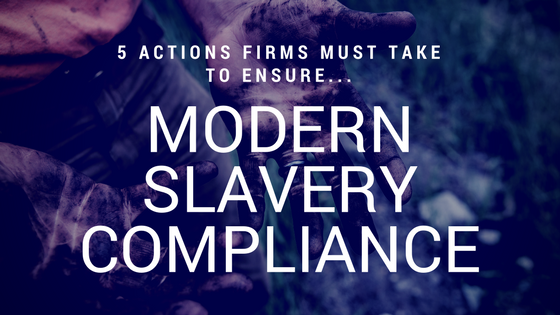

A 2016 survey carried out by the Altius team to question procurement professionals around the UK has thrown up some interesting correlations regarding modern slavery.
Despite the majority of respondents being aware of the importance of modern slavery and having a policy in place already, procurement professionals admitted that more needed to be done by their firm to ensure compliance going forward into 2017.
Here’s a look at just five of the key areas that respondents flagged as problem areas, and what actions can be done to ensure they are fully compliant in the future.

While 4 in 5 respondents said their company now has a Modern Slavery Act policy, 45% said that they cannot see evidence of the new policy being adhered to. This includes suppliers and contractors within the respondent’s supply chain.
For firms, simply having a modern slavery policy isn’t enough, especially for the procurement teams. Evidence needs to be gathered as part of supplier assessments and re-assessments to ensure they can show proof of compliance. For example, suppliers could show paperwork relating to the internal procedures they have in place whereby employees can flag up slavery concerns through a whistle-blowing scheme.

Less than 25% of respondents said that they have re-assessed their existing suppliers since the introduction of the Modern Slavery Act in 2015 – almost two years ago. On top of this, 55% admitted that they do not had any modern slavery-specific questions on their supplier assessment questionnaires.
Best practice of supply chain compliance states that existing suppliers should be re-assessed every 12 months at least. While the task can become a burden to procurement and health and safety professionals in-house, business can change considerably in a year, and firms must be aware of these changes in order to be sure their supply chain is fully compliant.

A sore point for survey respondents was the lack of support from their senior team in help dealing with the modern slavery legislation changes. 82% stated they wanted their senior team to do more to enforce compliance throughout the organisation, while only 47% agreed that their senior team fully understood what is deemed ‘illegal’ under the Act.
While procurement teams and health and safety professionals have the ability to manage the risks associated with non-compliance throughout the business and supply chain, ultimately, any blame for falling foul of the new legislation is at the door of the senior management team. Efforts should be made by procurement teams to flag the severe importance of compliance, as well as educating the Managing Director, etc. on what the legislation actually means.

When asked what percentage of their suppliers they believed were compliant to the Act, survey respondents averaged just 30% of their supply chain. One of the main reasons for this result may be down to the amount of time it takes for suppliers to confirm their compliance, thus making procurement teams wary.
47% of respondents confirmed this by saying they were concerned with how long it takes for suppliers to prove compliance. In this situation, procurement teams should pressurise their suppliers more for quicker responses. Automated compliance systems, for example, can help obtain the relevant documents without procurement needing to chase regularly for information.

One of the top challenges respondents said they’d face in 2017 is ‘identifying potential risks in their supply chain’. 41% believe there are hidden risks, however, the same respondents believed that their own procurement processes needs auditing for best practice.
It is clear from these two results that procurement teams need to establish whether their process and documentation is doing enough to collect the information required to pass suppliers as being compliant to modern slavery. Firms should look especially at their re-assessment questionnaires to begin, as well as their on-boarding documents for new suppliers such as PQQs (pre-qualification questionnaires).
Download your copy of The Modern Day Slavery Survey 2017 Report and discover what other areas procurement, health and safety and contract managers believe need action to be compliant to modern slavery.
The report, which has been endorsed by member of the Parliamentary Select Committee on the Modern Slavery Bill, the Rt Revd Dr Alastair Redfern, is available to download for free.